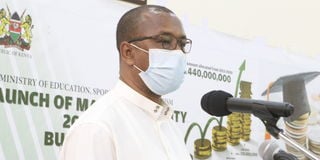Premium
Worry over KCSE performance in Mandera as teachers' shortage bites

Mandera County Director of Education Adan Roble speaking on January 15, 2021. He said shortage of teachers means the county risk of sending few students to universities due to poor performance in KCSE exams.
Mandera County risks recording a low number of students who will join universities after the March Kenya Certificate Secondary Education (KCSE) exams.
County Director of Education Adan Roble has said this, further revealing that at least four private secondary schools have been closed due to the effects of the Covid-19 pandemic.
“The acute shortage of teachers in Mandera will affect the outcome of the national examinations and I am worried that we will send very few students to universities this time round,” said Mr Roble.
At least 178 students in the 57 secondary schools in Mandera scored a C+ (plus) grade and above in the 2019 KCSE exam, managing to join institutions of higher learning.
“We are not going to get a good number of students scoring C+ and above in this year’s examinations because of the pitiful teachers’ shortage,” said Mr Roble.
To bridge the wide gap in the education sector in Mandera, Mr Roble challenged locals to send their children to teacher training colleges.
Take up teaching jobs
“We need to encourage our young generation to take up teaching jobs because this June we will have an intake for students to join teacher training colleges in the country,” he said.
At least four secondary schools in Mandera have only a principal with no other teachers, according to the education officer.
There are 57 public secondary schools in Mandera County.
Another 122 primary schools in this far flung county only have one teacher each.
An attempt by the local leadership to fill the gap in primary schools was thwarted by the Teachers Service Commission (TSC) in 2016.
TSC declined to have locals who scored D+ in KCSE to train as teachers.
“We had worked hard to get 197 students to join Mandera Teachers Training College but the TSC directive reduced the number to 26 who only had the required C plain grade,” said County education CEC Izzidun Abdullahi.
Teachers needed
With 295 public primary schools, Mandera needs 1,849 teachers to fill the gap. There are only 803 teachers currently.
Another 517 teachers are needed in the 57 public secondary schools which are being served by 385 tutors currently.
The majority of non-local teachers deserted the county in 2015 and others have since been transferred from Mandera due to insecurity posed by the Al-Shabaab terror cells.
Speaking during the launch of an education bursary for 38,713 students — both in secondary schools and institutions of higher learning — Mandera Governor Ali Roba said the county is facing a crisis in the education sector.
“While other Kenyans resumed learning after the Covid-19 break a week ago, in Mandera County we are faced with a crisis in the education sector,” he said.
He said learning is paralysed throughout the county because of Al-Shabaab terror menace that forced TSC to withdraw all non-local teachers.
“We have 57 public secondary schools and 295 public primary schools respectively. Due to TSC's withdrawal of teachers, the shortage of teachers in Mandera County stands at 1,849 for primary schools whereas in public secondary schools the shortage is 517,” said Mr Roba.
‘Socio-economic sabotage’
According to the county boss, the impact of children in Mandera failing to access education is tantamount to socio-economic sabotage.
“Al-Shabaab has succeeded in stopping learning in our region,” he said.
He said Mandera risks having a generation of people who never acquired education and appealed to President Uhuru Kenyatta to ensure the national government gives equal access to basic education for the people of Mandera, Wajir and Garissa counties who are equally affected by Teachers Service Commission actions.
Mr Roba urged the TSC to recruit untrained teachers for Mandera to help cushion the current problem.
“I appeal to TSC to understand that it is their responsibility to ensure we have teachers for our children in schools,” he said.
The governor called on the local community to remain committed in playing their individual and collective roles in order to turn around the education sector that is facing challenges.
“In this regard, security is paramount to uninterrupted learning and teaching programmes, which we need to uphold and safeguard at all times,” he said.





